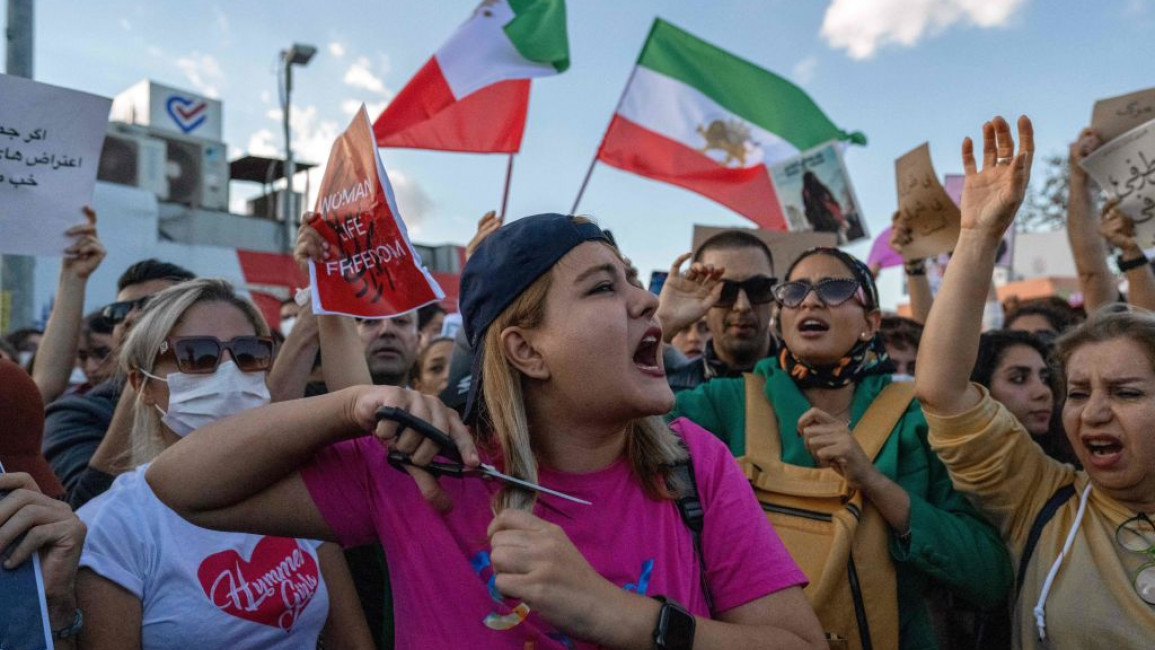
EU support for Iranian protestors rings hollow given its tough migration policies
As the nationwide protests in Iran picked up steam last September, world leaders, including European leaders, jumped on the bandwagon of international solidarity with the Iranian people.
From women members of the European Parliament chopping off their hair as a display of unity with the Iranian women, to foreign ministers giving impassioned speeches and vowing to freeze the assets of the Islamic Republic authorities responsible for the crackdown, expressions of support were pouring in from every corner. A new understanding had emerged that the uprising warranted reinforcement and advocacy.
The elders of the European Union expended some political capital and squared up to their counterparts in Tehran by openly consorting with the most militant ideologues of the diasporic opposition and invited divisive figures such as Maryam Rajavi, the leader of the unpopular cult Mojahedin-e-Khalq Organization (MEK), to address their parliaments. They believed the scenes unfolding in Iran heralded some imminent fundamental change, and that giving a platform to the radical dissidents seeking a similar outcome would fast-track that process.
''Support and empowerment are easily quantifiable, and if European states are sincere in their willingness to back the Iranians fighting for their rights, they can probably start by opening their doors to more of them as they find themselves enmeshed in a web of social strangulation and political extremism.''
At the peak of the protests, EU elites professed their support for the Iranian people in their statements, as they hunkered down to prove their commitment to democratic values wasn’t geographically selective, that they would throw their weight behind a movement that echoed the same aspirations that the West had long associated itself with.
But it transpired before long that beyond indulging some opposition figures, and a ream of rhetorical statements, the EU leaders didn’t have much to offer. Neither to deter the Islamic Republic from carrying out further violence, nor to practically help protesters as they endured state-inflicted trauma through repression.
As the internet shutdowns, mass detentions, summary trials and persecution drained the social mobility of the protesters, and the world was witness to the horrors of an unprecedented repression playing out before its eyes, the humanist Europe that claims credit for standing up for freedom everywhere could have at least offered the embattled Iranians a lifeline. But it simply didn’t.
The EU’s hostile immigration policy that has remained the poster child of the bloc’s direct engagement with ordinary Iranians, wasn’t relaxed in the middle of what was clearly an unmitigated sociopolitical crisis. The generous open-door policy that was introduced to embrace the war-stricken Ukrainians after the Russian invasion, or initiatives to admit Afghan refugees following the Taliban takeover in August 2021, weren’t extended to Iranians who were also desperate.
European leaders were relentless in their denunciation of the government in Tehran. Their actions, however, barely matched their words as they refused simple measures to relieve the suffering of those caught at the crossroads, including a temporarily amended immigration policy to relocate the most vulnerable citizens.
Instead of coming up with some friendly schemes that could help more people affected by the crackdown to leave the country smoothly, some of the existing frameworks, long desensitised to the collective woes of Iranians, were toughened, and alternative channels of communication dislodged.
In one instance, the German Foreign Office announced that it was reducing the presence of its cultural institutions working in Iran, centres that ultimately benefited young Iranians, including students who sought to develop their kills. It’s unclear why Germany thought this decision would debilitate a government that had long shrugged off international isolation.
VFS Global, the official subcontractor of consular services for the French embassy, released a statement that it later removed from its website, saying, “given the current situation in Iran, internet has been disrupted and as a result, the French visa centre in Tehran is not capable of processing visa applications.”
Also, as reported by Radio France Internationale, the Swiss and Spanish embassies in Tehran had communicated to several travel agencies that the issuance of Schengen visas to nationals of Iran was put on hold at the same time as the crescendo of protests. The director of the Association of Air Travel and Tourism Agencies of Iran said at the time that a number of Schengen zone countries had unofficially halted their visa services without making public announcements.
Although some EU embassies continued their operations, many of them suspended the allocation of new visa appointments for several weeks, resulting in a precipitous decline in outbound travel from Tehran as the uprising dragged on. Recent reports suggest even as the protests have fizzled out and normalcy has been restored, delays or disruptions in the processing of Iranians’ visa applications persist.
It is no longer regular administrative issues that the European embassies in Tehran cite as stumbling blocks to processing visa applications. They have increasingly failed to be transparent, and even corrupt in some of their practices that Iranians reckon is proof of their betrayal.
Haft-e Sobh Daily published a report in June exposing some European embassies in Tehran colluding with middlemen who sell appointment slots to helpless applicants for as much as €500 while the regular pathways to booking appointments through their websites remain blocked. Users have told BBC Persian that the Bulgarian embassy issues a visa in less than a week in return for €1,300 of off-the-record gratuity. The German and Italian embassies also charge the more well-off applicants €2,500 and cut corners to process their visas quickly, users say.
Other Iranians who have struggled with the EU embassies and their shady procedures complain that it is not possible anymore to file a standard visa application, appear for an interview and receive a decision in the traditional two-week window. The processing times have been prolonged to roughly two months, and worse, the chances of seeing a consular officer without paying inordinate sums to the brokers who facilitate appointments and sometimes guarantee visas, are almost inconceivable.
Indeed, for those embassies that are either given the green-light by their capitals to revel in these windfalls or perpetuate such arrangements autonomously, they are raking in money from students, researchers, businesspeople, artists, patients and families seeking reunion.
But even for those who pay the extortionate sums, EU borders continue to be discriminatory with odds heavily stacked against the nationals of Iran looking to set foot in the Schengen zone.
Once again, the gestures of unconditional support ring hollow.
The 2022 statistics indicate Iran was the 9th country with the most uniform Schengen visa application rejections. Out of 142,243 applications submitted by Iranians last year, a staggering total of 33,679 were declined, representing 23.7% of the requests filed. For the citizens of Russia, the rejection rate stood at 10% and for the nationals of Saudi Arabia, a mere 5.1% of the petitions were turned down.
The embassies of Sweden and Slovakia were particularly harsh on Iranians, refusing 60.3% and 41.4% of their visa applications respectively.
Support and empowerment are easily quantifiable, and if European states are sincere in their willingness to back the Iranians fighting for their rights, they can probably start by opening their doors to more of them as they find themselves enmeshed in a web of social strangulation and political extremism.
It is somewhat disingenuous to heap praise on a populace for their bravery and steadfastness and at the same time toil away at keeping them at arm’s length.
Possibilities for the people of Iran, especially the younger generation, are limited, and their struggles with a government trying to stifle their voices are often compounded by their economic hardships. It is unfair to place arbitrary barriers when they still largely rely on the legal migration routes to move out.
The EU needs a complete structural reassessment of how it’s translating its promise of standing for democracy and human rights in Iran. Words are not enough, leaders must take action.
Kourosh Ziabari is an award-winning Iranian journalist and reporter. He is the Iran correspondent of Fair Observer and Asia Times. He is the recipient of a Chevening Award from the UK's Foreign and Commonwealth Office and an American Middle Eastern Network for Dialogue at Stanford Fellowship.
Follow him on Twitter: @KZiabari
Have questions or comments? Email us at: editorial-english@newarab.com
Opinions expressed here are the author's own, and do not necessarily reflect those of her employer, or of The New Arab and its editorial board or staff.




